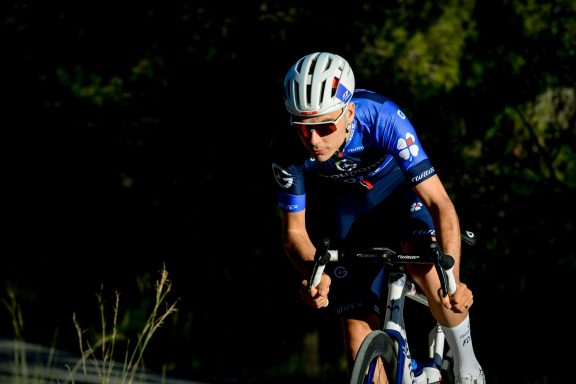He was one of the main transfers of the past winter. After his double victory on the Tour de l’Ain and two spectacular stage wins on the Vuelta, Australia’s Michael Storer joined the Groupama-FDJ for 2022. The 25 year-old climber had even agreed with the team before these performances. In this interview, he looks back on the start of his career, his constant improvement, and his goals with his new colours.
Michael, you just completed your first races with the team. How did it go?
I think the races went well. We did not get the results we wanted but we were very close. On the Tour de la Provence, Tobias Ludvigsson was third on the time trial, and on the Tour des Alpes-Maritimes et du Var, Valentin and Thibaut also took third on stages. Those are still good results. I had the opportunity to race with a lot of strong riders within the team, they have a lot of experiences as well, which makes it easier in the race. Physically, I did not feel that great in these first two races, but I have surely been improving. I’m now going to keep training and try to get that bit of extra fitness before Paris-Nice and Volta a Catalunya.
“I wanted to know how far I could go”
How was it to break away together with Thibaut in the last stage of the Tour des Alpes-Maritimes et du Var?
It was really nice racing with Thibaut. I think we can have some fun on the climbing races in the future. He’s a rider with so much experience, it’s so easy to work with him. He knows what to do, I can easily talk to him and most of the time we’re on the same page. And that was just in one race! It was very difficult in this last stage, but it was also a fun race to do. I could definitely notice that he’s one of the most popular French riders at the moment, and it’s cool to see so much excitement from the fans. Most of the time, the fans of Thibaut are also fans of Groupama-FDJ, so I could benefit from their support as well. I enjoyed riding with Thibaut and I’m also looking forward to my first race with David in Paris-Nice.
Can you tell us more about yourself and your background?
I come from Perth, in Western Australia. It has a climate a bit like Southern Spain. We have very hot, dry summers, and some rain in the winter. But never snow. The weather is great for activities outside, and I was a very active person growing up. I started with athletics and then moved to cycling just because I enjoyed riding my bike. I really started at 12 years old, and I did some competition, but it was more for the enjoyment. I did take it relatively seriously early on because I liked to be good at the sport I was doing, but it was never too much.
When did you start thinking about a professional career?
When I was in juniors, I did not think about turning professional because I did not know if it was possible or not. However, I wanted to see how far I could go. I was only thinking about the next step. When I was 16-17, I was just thinking about making it to my first World Championships, because that was the next step at the time. You have to go through all the steps before you can go professional, so I did not really think three or four steps ahead. I was just thinking about the next one. Then I was like « if I can achieve this step, then I can move on to the next one ». With the results I got in juniors (medals in the Australian, Oceanian and World’s championships, editor’s note), I was considering that it could get me into a good team for the U23, as you don’t usually go straight from the juniors to the WorldTour. I managed to join a good U23 team, and the next step was to do well in the U23 ranks.
“The only expectation I put on myself was to work hard to improve”
How did your personal process unfold throughout the U23 years?
For me it was not so hard, because at the time there was a very good development program, so everything was set up well. When there is a pathway all ready, it is not too difficult at all. In the juniors and U23, I was already able to come to Europe to compete in some races. As a U19, I may have spent three months here. In the first year U23, it was maybe four or five months, and even more in my second year U23. That was a gradual stay over the years. The main difference at that point was being away from friends and family. It was actually the only real difference. However, I did understand what trying to go pro involved before doing it. Then, it is also easier when you go gradually like I did because you’re used to being away. It became normal for me.
Where have you settled in Europe?
I’ve now decided to stay in Italy. Before that, I spent some time in the Netherlands because as a non-European, it was easier with my contract. I also spent time in a few other places actually. On and off, let’s say that I have been in Italy for four years. I’m in Varese. I chose it because we were coming here with the national team, and I liked it. It is a good training area for sure, the only problems are sometimes the road quality and the traffic. You have to be careful. There are some other cyclists here, including Simon Clarke as a fellow countryman, and some local Italian riders as well.
You’ve been professional for four years now. Is the start of your career like what you hoped for?
Turning pro, I just wanted to keep improving and I was hoping to win a race, but it is always hard to say what your potential is. The only expectation I put on myself was to work hard to improve. If that made me one of the best in the world, then good, but the most important part was always the work ethics for me. Although I had some good U23 years, it was not frustrating at all not to get big results at first, as I did not expect to win straight away. I also knew I was not good enough in the first two years and that winning would be very unlikely. I just wanted to keep working to improve myself and just hope that one day I could just be good enough.
“That victory was four years of hard work”
Did you think you could be not good enough?
Teams often get excited about the new young rider, and if you don’t do anything special in your first two years, it can happen that they prefer to bring on a new rider. Some teams work this way. It’s great for the new rider, of course, but for yourself it is not ideal. It never worried me though, because if it happens and if I’ve done my best, then what more can I do? If I’m not good enough then I’m not good enough. If some riders are better than me and take my place, that’s pretty much out of my control.
But you did keep improving years after years. Was it your plan?
I think this is just how I’m made. You can’t plan this. It would have been great to have a crazy year at the start of my career, win some races straight away, but it did not happen. I think it is another thing that is not entirely in my control: the way I’m improving. Maybe I can keep progressing further, maybe my performances are at their peak. I don’t know, but it seems that every year I’m getting a little bit better and it’s a good thing. People call my 2021 year a breakthrough, but it is not really. I just managed to get a little bit better, and instead of coming into the top-10s, I could compete for the victories. In 2020, I got third on a stage in the Vuelta, third on a stage at Alpes Maritimes, some top-10s here and there. These top-10s just turned into best results. I just think that the work over the years started to pay off. Before that, I was just missing a bit of everything, so by improving everything a little bit more, I simply became a better rider.
Starting the Tour de l’Ain last year, were you confident you could win?
My mindset was a little bit different than usual. I knew from my training that I would have a really good shot at winning the race. I had that in mind from the start. The numbers were very good. I know what’s needed in racing typically, and I was achieving that so I knew I could do it on the physical side. Knowing that, I also was prepared to gamble a bit more. I was not racing for second or third at the Tour de l’Ain, I was racing for the victory. In some previous races, I also thought that I could be very competitive, but going into the Tour de l’Ain, it’s true that I was confident I could win. That is something that hadn’t really happened to me before. I knew it would be possible just because training had gone perfectly. So, to win the last stage solo and the general classification was a relief. That victory was four years of hard work and trying to improve, so it was really special to finally make it.
“The way the team works was attractive for me”
How much do your wins on the Vuelta depend on these victories on the Tour de l’Ain?
To be honest, I think I could still have won on the Vuelta without winning beforehand on the Tour de l’Ain. It surely gave me some confidence, but cycling is still a numbers’ game at the end of the day. Sometimes, it’s just the hard facts. You can make small differences on tactics but if someone is much stronger than you, then it’s really difficult to win. I think confidence is a bit overrated. It’s just my opinion, but it hasn’t really changed my approach to the race. It just made me realize I could get better results, that’s all. This being said, I felt amazing winning two stages. I definitely did better than my own expectations. I was hoping to win one stage at the Vuelta, but I was also there to support Romain Bardet for the general classification. It could have been difficult because you don’t have that many opportunities when you’re riding for GC support, but the plans changed along the way and then we had a new strategy to go for stage wins instead. You also need the right circumstances.
The Groupama-FDJ cycling team did not wait for you to win to get in touch with you.
Indeed. They saw my performances at the Giro and my progression over the years, and they were really interested in having me in the team. They looked at things more deeply, not just picking up the obvious rider who win some races. They saw that I was doing a 100% support role at the Giro and that I was staying with the best on the climbs. Even if I was not there winning, they still saw the potential. I was a little bit surprised that a French team approached me at first, but when I found out more about the team, then I was less surprised. I knew it was a very good team, and I also realized how professional the setup was. The way the team works was attractive for me, and I thought it would be a good fit. I just learnt about the team as they showed interest, and based on the circumstances, I made the choice that seemed the best one for me.
How were your first meetings with the team?
The team really welcomed me, and everyone was really friendly. It’s not difficult to fit in but it surely takes some time to know everyone. They also understand I need some time to become better in French. Sometimes in the meetings, I can ask for a translation, but to be honest, I understand 80% of what’s going on. I’ve done Italian for ten years and it did not take me long to get the basics of French even if it’s hard. Also, the team is more and more international, so there are quite a lot of guys that speak English.
“It’s my career, and I’ll make it what I like”
How do you approach 2022 after what you’ve achieved last year?
I think I’ll need to try different strategies in racing, but what worked in the past can work also in the future. Considering that other riders know me a little bit more now, I already saw in the first two races that I had to change tactics a little, but it’s possible to adjust. A lot of more successful riders still win races despite being marked or having people working against them. I just need to keep learning, keep improving, and the results should keep coming.
Do you feel any external expectations?
The team doesn’t put any pressure on me because they probably know that I already put enough pressure on myself. So, they don’t need to. I don’t really pay attention to other people’s expectations. It’s my career, and I’ll make it what I like. That is my approach. Other people probably expect more of me after 2021 but what counts more is how I feel for myself than what others do for me. Of course, it is nice they show excitement, and that is also what makes sports nice. My own expectation is to reach at least the same level performance than at the previous Vuelta, and I hope to move up even more steps and win something big.
Where do you want to further improve?
I think working on the time trial is important if I want to have a go on the general classification in some races. It’s really important, but never at the expense of what I’m best at, and never if it takes away from the climbing part. I may go for the general classification in the future, I don’t know, I think I’ll just see how it goes in the racing in the next two years.
Finally, you’ve been confirmed for the next Tour de France. How does it feel?
I think it just shows a lot of faith in me, which is nice, because I also showed a lot of faith in the team in joining them. It’s nice to see that people are confident in my ability to get to the Tour and to be useful there. For sure, it’s a big motivation and it’s really helpful. Having that trust in each other is important. You can get results without all this, but I believe it must be a benefit. For now, I try not to think about the Tour. I really like to just think about what’s next rather than looking too far ahead. But definitely, it’s something I’ve been dreaming about for a long time, and I’m really excited to race the Tour. I’m really looking forward to it but it’s not the focus at the moment.



No comment